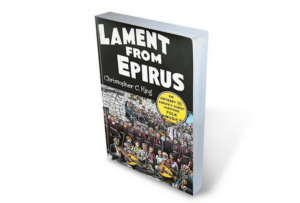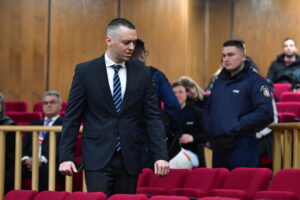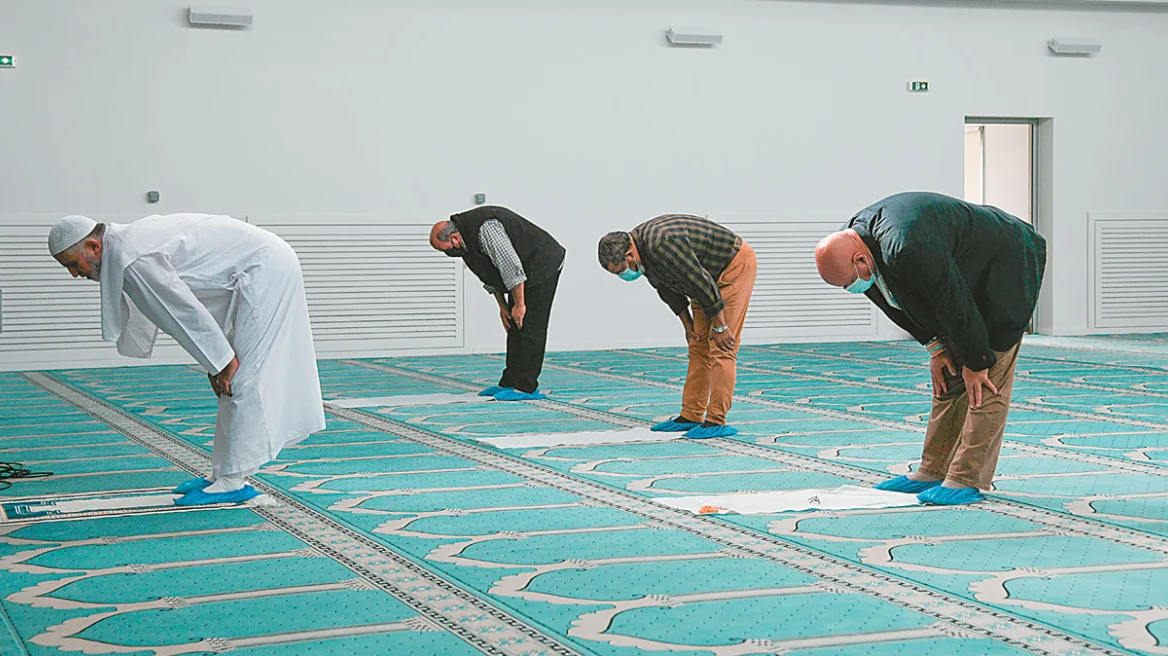The great ethnomusicologist and Grammy-winning producer Christopher S. King talks about his honorary naturalization. The new Greek citizen’s love for traditional music, which he strives to save with all his might. His accidental acquaintance with the people of Epirus led him to settle in Greece.
On July 11, he was awarded Greek citizenship. In a special ceremony held at the Maximos Palace, he took the oath of Greek citizenship in front of the Secretary General of Citizenship Athanasios Balerbas, in the presence of Prime Minister Kyriakos Mitsotakis. A lover of our country, and especially of Epirus, Christopher King has devoted himself for the last 10 years to the study of Greek folk song and its preservation, while in 2018 he published the book “Lament from Epirus: An Odyssey into Europe’s Oldest Surviving Folk Music“.
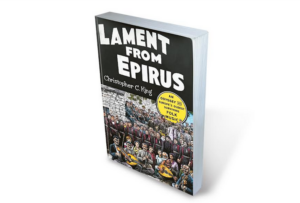
His research is multifaceted and meaningful as he approaches the tradition of Greece in an anthropocentric and cross-cultural way, collecting extremely interesting primary material. His inexhaustible love for Epirus, which came from his accidental contact with the old copy of a magical -according to him- Greek traditional song in an antique shop in Constantinople, was the trigger for his research. As an avid collector of gramophone records, he began looking for one record after another. “They caused me a strange dizziness, they pushed me into a complete sonic disorientation”, he writes in his book. “I felt something pulling me, but I didn’t resist – I couldn’t resist. […] It was a necessary cleansing. As I sat listening to this music, I lost all sense of time. […] The records had something beyond sound – an unknown purpose, a function”.
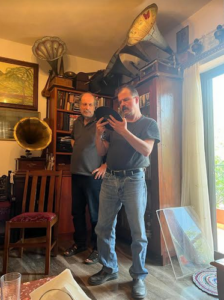
This is how he began to search for the origin, the meaning, the history that was hidden behind every Greek folk song, which was connected to the history, the people and the geography of each place. But the ones that piqued his interest the most and stole his heart came from Epirus. The place he visited, got to know, loved and in 2021, full of experiences and emotions, he decided to make it his permanent place of residence.
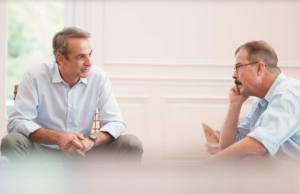
– So Chris, tell us, what exactly an ethnomusicologist is?
For me, an ethnomusicologist uses music as a lens through which to understand and interpret history and culture. Because history is a process of redaction and culture is a process of appropriation, music (particularly music preserved on the 78 rpm disc) captures ethnology in a relatively stable way. Understanding folk music is a way to understand ethnographic processes. But for me, it is also very simple. I like to tell stories through the music contained on 78 rpm discs.
– What did you study?
I studied philosophy & religion in college but I’ve always been obsessed with history and narrative forms like music and literature.
– What is so attractive to you about the music of Epirus? When did you decide to focus on that particular music and region?
I appreciate that the music of Epirus is very raw and unvarnished, like the old-time music of America. I also love that many of the pieces of music have a distinct function completely removed from dancing or listening. I’ve been studying demotiki musiki for over ten years now.
– What is Epirus for you in general?
It is a place where I can live and breathe freely. It’s a place where I can be myself and be free to write, research, and savor life.
– What amazing things or stories have you found out during your research? Do you remember any story that really touched you to tell us?
I think the most startling thing I discovered was that in Konitsa, there is physical, tangible evidence of the interconnectiveness of folk music from across the Pindus and the southern Balkan region. It’s in the architecture, the ways of playing the klarino and violin, the ways of dancing. Konitsa is a very tangible place for understanding how music works, how it relates to humanity. I have marvelous nightingales that sing all day long at my house. Therefore I have free Epirotic music in my backyard.
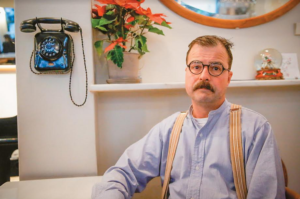
– Do you think that the folk music of our people will remain alive for ages? And what would you suggest to ensure that it will remain alive…
I think music stays alive for people who appreciate its deepest function. If we don’t think music has anything to offer us, then it will give us nothing. If we think music can give us everything, then it will. I think the most important thing is for us (we Greeks) is to form a strong library of sound recordings, like the Library of Congress in America, to preserve our musical past and to make it 100% accessible to all people. I think we must do this by archiving the earliest recordings on 78 rpm up to our contemporary demotic music and then preserving and digitizing them. Then this will give our future musicians the raw material to create the next generation of demotic music. As well as the raw material for research from musiciologists, historians, sociologists, etc.
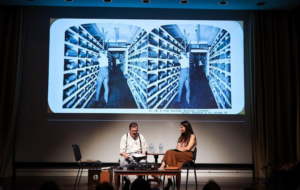
– Are there any other fans of folk music in Greece that do a remarkable job? Do you want to introduce them to us?
There are so many to name. Most of my friends also love this music like Katerina Kafentzi, Lambros Liavas, Pantelis Bouchalis, Pavlos Tsimas, and literally hundreds of others. I don’t want to list them all because everyone contributes in their own way to elevating and celebrating demotic music. And I love all of my friends.
– What is music for you?
Music is something interesting that we can do with air.
– Tell us about Eprus miroloi.
It is the most profound, sad, emotional expression that humanity has ever constructed. I encourage everyone to listen to Alexis Zoumbas’ “Epirotiko Mirologi”.
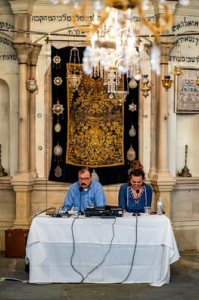
– How came the decision to move to Konitsa?
Agapimenimou Katerina Kafentzi helped find me a place with her cousin Alexandros Sergiannis.
– Was it an easy decision?
It was the best decision in my life.
– And did you find any difficulties in making this wish come true?
No, because everyone in Konitsa–from the mayor, to the vice mayor, to the postman, butcher, green grocer, the landlord—everyone in Konitsa–has made my moving to Konitsa like I’ve moved into the home I’ve always wanted.
– What do you miss from the US?
Fried chicken. Country ham. Cowboy shirts. Cheap, used bookstores.
– What are you doing when you don’t work? Do you have any hobbies in Konitsa?
I write all the time. I research and read and investigate all the time. Konitsa is a perfect environment for this. My hobbies in Konitsa are mainly gardening and keeping my house and collection clean. I have a very stable, happy life there.
– Which part of your job is the most exciting and why?
The most exciting part of ethnomusicology is that I am constantly surprised at what I discover. Because culture is something that proves that everything is interconnected, I have startling revelations about the connections between dance and music, food, architecture, agriculture. Everything becomes very exciting when you realize we are dealing with complex systems.
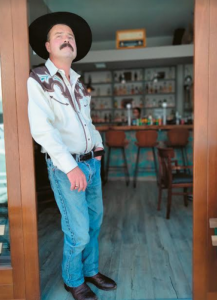
– What are your plans for the future?
I am bringing the all-female polyphonic group Isokratisses to America in October to perform at various venues. The eight women and I have been invited to perform at the Kennedy Center, in Washington, DC!!! Also, I have produced Isokratisses first album for Jack White’s Third Man Records label. Additionally, in September I’ve been invited to give a talk at Berkeley, at the University of California, for the MacArthur Foundation. I’ll be talking about “Historical Amnesia” and how it connects with music and nation-building. It’s a theme I developed when I gave a series of presentations in Athens, Thessaloniki, and Ioannina on the role of Greek-Jewish Women in Demotic Music. I’m also working on several pieces of fiction including two novellas that take place in Greece, in the north. Finally, I hope to create a centre for the collection and preservation of southern Balkan music.
– Will you go to any Greek islands for vacation? Which are your favourite cities, villages or islands in Greece?
I’m not much of an island person. I’m more of a mountain guy. It’s like the difference between a cat-person and a dog-person. That being said, I do greatly like Crete–around Chania and in the mountains. I’d love to be invited to Chania to do a music presentation. Also–I really like the raki on Crete.
– How do you feel about your Greek honorary citizenship?
I feel as if I have been made whole. As if I am home. It is the greatest honor that I’ve ever received. I am humbled by the trust and generosity of the Greek people.
Ask me anything
Explore related questions
